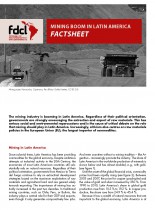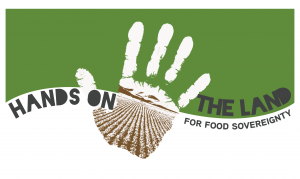
The mining industry is booming in Latin America. Regardless of their political orientation, governments are strongly encouraging the extraction and export of raw materials. This has serious social and environmental repercussions and is the cause of critical debate on the role that mining should play in Latin America. Increasingly, criticism also centres on raw materials policies in the European Union (EU), the largest importer of commodities.
Since colonial times, Latin America has been providing commodities for the global economy. Despite ambitious attempts at industrial activity in the 20th Century, the economies of most Latin American countries still substantially rely on natural resources. Regardless of their political orientation, governments from Mexico to Tierra del Fuego continue to rely on extractivist development
strategies based on the maximum exploitation of raw materials and agricultural land and are geared solely towards exporting. The importance of mining has actually increased in the past two decades. In traditional mining countries, such as Chile, Peru, or Bolivia, the industry plays a central role for their GDP and exports, even though it only generates comparatively few jobs. And even countries without a mining tradition – like Argentina – increasingly promote the industry. The share of Latin America in the worldwide production of minerals is shown below and has almost doubled, e. g., with gold.
Publisher:
Forschungs- und Dokumentationszentrum Chile-Lateinamerika e. V.
Gneisenaustraße 2a, 10961 Berlin
www.fdcl.org
Author: Tobias Lambert
Layout: STUDIO114.de | Michael Chudoba
Print: 15 Grad | Zossener Straße 55 | 10961 Berlin
Printed on 100 % recycled paper, CO2 neutral production (Envirotop).
Based on the Factsheet of Coordinación Observatorio de Conflictos Mineros de América Latina OCMAL – www.ocmal.org
FDCL-Verlag, Berlin 2015
This work is licensed under a Creative Commons, Attribution – Noncommercial – Share Alike, 4.0 International Licence (CC BY-NC-SA 4.0).
This publication has been produced with financial support from the European Union. The contents of this publication are the sole responsibility of publishing organisations and can in no way
be taken to reflect the views of the European Union
Zur Kampagne „Hands on the Land for Food Sovereignty“

